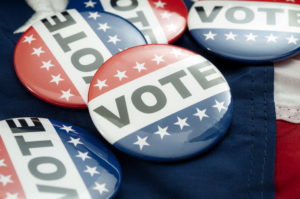Women as the Backbone of Democracy
Originally published by Kevin Johnson for National Press Foundation
Long a traditional gateway for women in government, elections administration is requiring more of its leaders – and women are increasingly taking top roles in state and local jurisdictions.
“For a long time, elections were perceived as very, very administrative, very paper-based … and so it was seen as an easier way for women to get into particularly local government,” said Amy Cohen, executive director of the National Association of State Election Directors.
Now operating in a volatile political environment where elections administration has been designated as part of the nation’s critical infrastructure, officials told the 2024 National Press Foundation’s Women in Politics Journalism fellows that the job has “grown exponentially really pretty quickly.”
Cohen joined Linda Lamone, a former longtime elections director in Maryland, in a wide-ranging discussion of the challenges facing election operations with the 2024 presidential vote looming.
“Elections are complicated; there are a lot of moving parts,” Lamone said. “You’ve got voter registration, you have to find the polling places, you have to design the ballots. You have to print the ballots, you have to test your voting equipment. You have to find and train all these poll workers, hundreds of them … you have to count the ballots, you have to certify the election and all of us now are subject to various kinds of audits when they’re done.”
Supporting the operations in thousands of jurisdictions are non-partisan staff, who have largely worked behind the scenes until the contentious 2020 election thrust even poll workers into the spotlight.
“One of the things we are most concerned about for this year and over the last several years is the proliferation of false information about elections,” Cohen said. “And it means that it is even more important for accurate, reliable information about elections to be coming from election officials.”
Cohen urged journalists to engage with their local election officials.
“No one knows who their local election official is, but when you are putting them in media, you’re giving them a platform,” Cohen said.
“You’re going to learn a lot when you reach out to an election office and especially a local election office … so voting equipment, testing, other things like that, certification, audits, all of that is open to the public and gives the public an opportunity to see what’s going on. And also that we’re not hiding anything because election officials care deeply about transparency.”
